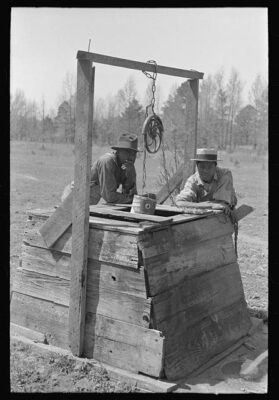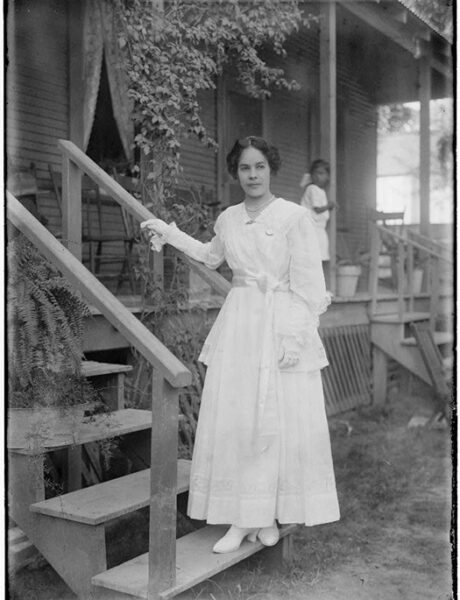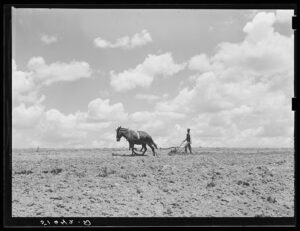My Southern Legitimacy Statement follows: My mother had me in a Baptist hospital in Knoxville, Tennessee, and my father almost missed my birth because he was watching the Andy Griffith Show. I was raised in a house that had a creek in the backyard and a picture of Elvis on the mantel. And I was the only Kindergartner that knew all the words to “Ring of Fire.”
Three Poems
Kneeling In Snow
Clouds suck in their underbellies
while grasshoppers sway
beneath the swallowed moon,
emitting only a broken
glow, like a memory that’s almost
forgotten–not unlike the picture
of Mamaw Lila that hangs
in the hallway of my parents’ home,
the one found in the bottom
of a water damaged box
that my father cleaned
and scanned and touched
with the cursor of his computer
until the yellow
spot covering her laugh
had faded into her skin, her young woman
skin, fully on display in a polka-dotted bikini,
unblemished by cigarettes
and children and the booze
soaked fist of Papaw Roy.
Inside the black frame that holds her,
her skin is kept white and unbruised
by the stories my mother only told me
after Lila’s coffin had shut.
Outside, I breathe
the glass air and its edges scratch
my lungs. My fingers reach for fallen
keys in snow, now grayed by night’s black
dye. My arms stretch as they did when I was small, pulling
their edges toward the back
of Lila’s fridge
for the frosted blue can of Pepsi
I wasn’t supposed to
tell Mom about. My knees sink
in the snow, making rounded dents
in its dust, like the dimples left
in church carpets, and I wonder
if the prayers I was taught
in Catholic school were enough
to carry Lila away
from the Hell I was warned
about by a man with a white collar
tightened to his neck, one no different
than the collar attached to a dog’s leash.
I remember him standing
in front of altars, in front of classrooms,
in front of girls he scolded
for short skirts and boys he praised
as fine young men, and I remember
the shape of his smirk
when he told us Hell would be an ice
rink, but we’d be dressed for a pool.
And as the snow turns to a darkened
puddle beneath my knees, I remember Lila’s
unscarred skin, I remember the polka-dots
spotting her breasts, I remember the lines
carved into the hand I held
the month before she died, and I wonder
if she, too, is kneeling in snow.
Poor Whore
I don’t like the taste
of the word whore. It doesn’t sit right
in my cheek, stings
like whiskey with too much
of a lemon twist. That boy that’s in pictures
now didn’t like it either. Called me
darlin’, even when he was handing me
the cash. I see him on the motel screen
some nights. His wife’s got yella hair and diamonds
hot glued to her tits. Pretty lil’ thing.
I overhear them church women
in the Wal-Mart, talkin’ about how I should’ve gone
with him to the city. That poor whore,
they say. She coulda had a ring
the size of Saturn and a kitchen
with an island—and a maid to clean it.
They quiet quick when they see me in the aisle,
holding a box of Cap’n Crunch over my chest.
Them women never saw the bruise left by that boy’s class
ring on the night I said I’m just not
sure. The purple spread down
my jaw like Mama’s apple butter. I had to wait
‘til he left to pick my teeth up off the carpet.
It’s just easier to let them think
meth knocked ‘em out. So when I’m slurping
my cereal from a Styrofoam cup
and see that boy on the motel TV,
gripping the sides of that shiny girl’s waist, all I can think is
that poor whore.
Sleeping In My Childhood Bedroom As An Adult
Glow in the dark stars tumble
into black, their light hanging
like the feet
of a man tied to death. I trace
the outlines of memories and pull them
to my nose, they smell like
patchouli and my father’s
velvet coat. Gray shapes
dance to the window. Are they
the ghosts of my dead dogs
or the angels I overheard
my mother asking for help? Or maybe just
teenage headlights, sneaking back into their parents’
driveway. The laundry
room moans and shakes
behind a poster
of New York City’s face. The dryer thumps
against my wall. Round
round round. Clothes rise
and fall
like the air lifting up my chest. My mother’s
Elvis T-shirt. My father’s white
briefs. The noise goes
in circles. Up
and down. Taped on the fridge
is a photo dated two
days after my birth. My mother is holding
my head to her chest, my feet swing above
Elvis’s bleached teeth. And I still remember
my father
getting nervous and shouting
and shutting
the door when my brother and I found
him in his white briefs. Rise
and fall. I focus on the dark
and the noise and the clothes
that make the
dark warm. Up
and down.
Rise
and fall. Round
round round.







